
150 years ago members of the Church of Jesus Christ of Latter-day Saints
trekked from Illinois to Salt Lake City, Utah to found a new Temple. In a
celebration of faith, hundreds of Mormons are retracing that journey this
summer. Richard Ostling, Time Magazineís religion correspondent, reports

 RICHARD OSTLING: Hundreds of
(members of the Church of Jesus Christ of) Latter-day Saints, also known as
Mormons, have been wending their way across the Midwest these past weeks,
reliving the arduous migration of their ancestors 150 years ago. The original
pioneers, facing persecution for their unusual beliefs and stunned by the
murder of their founding prophet, Joseph Smith, fled Illinois. Heading West,
they created a new spiritual kingdom at Salt Lake City.
RICHARD OSTLING: Hundreds of
(members of the Church of Jesus Christ of) Latter-day Saints, also known as
Mormons, have been wending their way across the Midwest these past weeks,
reliving the arduous migration of their ancestors 150 years ago. The original
pioneers, facing persecution for their unusual beliefs and stunned by the
murder of their founding prophet, Joseph Smith, fled Illinois. Heading West,
they created a new spiritual kingdom at Salt Lake City.
Today, that city is the heart of a religious empire that is spread
throughout the United States, and Mormonism is one of the fastest growing
faiths overseas. Over half its 10 million members now live outside this
country. (music in background) The current president of the church, Gordon
Hinckley, is ever present at Salt Lake City events like this pioneer
celebration. But heís just as likely to be in China or one of the other
nations where Mormons do missionary work.
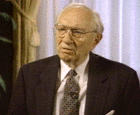 PRESIDENT GORDON
HINCKLEY, Church of Jesus Christ of Latter-day Saints: We give them an
assurance of who they are, sons and daughters of God. People find comfort.
They find peace. They find strength in that. And in the organization they find
sociability. They find friends. Weíre a very friendly church. Weíre a very
happy church. Weíre a happy, go-ahead people. And others like it.
PRESIDENT GORDON
HINCKLEY, Church of Jesus Christ of Latter-day Saints: We give them an
assurance of who they are, sons and daughters of God. People find comfort.
They find peace. They find strength in that. And in the organization they find
sociability. They find friends. Weíre a very friendly church. Weíre a very
happy church. Weíre a happy, go-ahead people. And others like it.
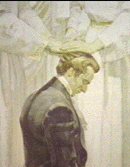 RICHARD OSTLING:
Unlike religions that have existed since ancient times, Mormonism is a
uniquely American faith founded in the 1820's. Joseph Smith said God and Jesus
appeared to him and told him that Christianity was corrupt. Later, he was
instructed by an angel to dig up and translate buried scriptures, which became
the Book of Mormon. Smith was told to restore the true religion. From Smith on
down to Gordon Hinckley, Mormon presidents have claimed a unique authority to
reveal define truth. Historian Jan Shipps says the church has Christian roots
but is a new religion.
RICHARD OSTLING:
Unlike religions that have existed since ancient times, Mormonism is a
uniquely American faith founded in the 1820's. Joseph Smith said God and Jesus
appeared to him and told him that Christianity was corrupt. Later, he was
instructed by an angel to dig up and translate buried scriptures, which became
the Book of Mormon. Smith was told to restore the true religion. From Smith on
down to Gordon Hinckley, Mormon presidents have claimed a unique authority to
reveal define truth. Historian Jan Shipps says the church has Christian roots
but is a new religion.
JAN SHIPPS, Historian: In the early years the Christians thought they had
found the best way to be Jewish, and 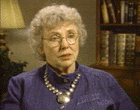 300
years later, they realized they were not Jews. The Mormons started out
thinking they had found the very best way to be Christians; that they are the
restoration; they are the restored church; they are the restored priesthood.
300
years later, they realized they were not Jews. The Mormons started out
thinking they had found the very best way to be Christians; that they are the
restoration; they are the restored church; they are the restored priesthood.
RICHARD OSTLING: From the start, theyíve had a rocky road. Mormons were
persecuted for their practice of polygamy, which was dropped in 1890, and they
were criticized for barring blacks from church offices. That policy changed in
1978. Since then, the church has more than doubled, and past conflicts no
longer hamper Mormon growth. A huge missionary force, currently numbering
55,000 people, volunteers to spread the message, not just of Mormon doctrines,
but family values and clean, healthy living.
(people singing in background) The short-term missions serves not only to
expand the religion but to solidify the faith of the missionaries, themselves.
Salt Lake city businessman Jim Kimball says when he went on his mission as a
young man, he was a skeptic, with little knowledge of the faith.
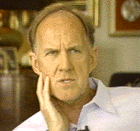 JIM KIMBALL: An uncle of
mine wrote in his diary that the gospel must be true because missionaries like
me would have ruined it a long time ago, and thatís the way I felt. I--he
said that he was under the impression, as I was I, that Epistles were wives of
the apostles when he left to enter the missionary work. And so I went out,
blissfully ignorant.
JIM KIMBALL: An uncle of
mine wrote in his diary that the gospel must be true because missionaries like
me would have ruined it a long time ago, and thatís the way I felt. I--he
said that he was under the impression, as I was I, that Epistles were wives of
the apostles when he left to enter the missionary work. And so I went out,
blissfully ignorant.
RICHARD OSTLING: Working in Australian, he was persuaded by the effect the
religion had on people.
JIM KIMBALL: I saw men who were abusing their wives and children and who
were in a drunken state most of the time after work--and their homes were
unkept and their lives were a mess, and I--I saw a manifest change in those
people. The revelations to Joseph Smith from God just rang so true to me and
made such enormous sense, and it took months--I was out there months before it
finally hit me that the church was true. As a friend of mine wrote,
"Iíd be cosmically orphaned without it." (people singing in
background)
RICHARD OSTLING: People said his congregation in Salt Lake City gives him a
sense of small town community. Like all members, heís assigned to a
neighborhood ward, where volunteers lead worships since thereís no 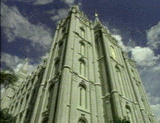 ordained
clergy. That sense of community was evident when the men met after worship.
ordained
clergy. That sense of community was evident when the men met after worship.
SPOKESMAN: Sister Makiko Tonda is moving this Thursday. So are there any
brothers here that have some trucks that could help out with that? Dave, Joe,
Ty.
JIM KIMBALL: Weíre involved in each otherís lives. We care and love for
one another. If my wife is sick, the Relief Society shows up at my front door
with their famous green Jell-O salad and potatoes au gratin and ham, shredded
carrot, green salad, and you know, thatís great. Iíve been called to go
help people recover from a flooded basement, tear out all the old carpet, or a
burned down house, and I really think--as I view life--thatís what itís
all about is involvement with others.
RICHARD OSTLING: Secret and distinct rituals in temples help solidify
Mormon identity.
JIM KIMBALL: Is there anyone that has a problem with those kinds of
obligations you take on yourself?
RICHARD OSTLING: Once a month Kimball teaches a class for young adults
preparing for temple ceremonies. Only those who give 10 percent of their
income to the church and follow such health requirements as abstaining from
coffee, alcohol, and tobacco are allowed in. The temple rituals range from
sealing marriage for eternity, as new brides and grooms do daily, to
performing proxy baptisms, to offer salvation to dead ancestors. In this way,
the Latter-day Saints extend their family emphasis to creating eternal
families in heaven.
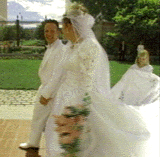 Though Mormons insist
theyíre followers of Jesus Christ and feature Him prominently in their
visitorsí center and in their prostheletyzing, others think the church
misrepresents Christianity. Thomas Taylor is a Presbyterian minister in Salt
Lake. Two years ago, his denomination declared that Mormons are not Christians
in the traditional sense.
Though Mormons insist
theyíre followers of Jesus Christ and feature Him prominently in their
visitorsí center and in their prostheletyzing, others think the church
misrepresents Christianity. Thomas Taylor is a Presbyterian minister in Salt
Lake. Two years ago, his denomination declared that Mormons are not Christians
in the traditional sense.
REV. THOMAS TAYLOR, First Presbyterian Church: Have I ever known any
Mormons who, after speaking with them, have I come to believe that they know
Jesus Christ in the same way that I do; that they are real true disciples of
Jesus, my answer would be, yes. But if youíre asking me, do I think that
Mormonism as a system of belief and practice is the same as what we ordinarily
mean by Christianity, I think my answer would be no.
RICHARD OSTLING: The major doctrinal difference centers on the nature of
God.
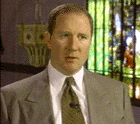 REV. THOMAS TAYLOR: The
Bible says in the Book of John, Chapter 4, God is spirit. But the Mormons say
that God is flesh and bone. You get a picture of God that is progressing. So
you see that man is made of the same stuff, as it were, as God is; and that
man is progressing toward deityhood, and God once was like man. So this is a
very different picture of Christianity.
REV. THOMAS TAYLOR: The
Bible says in the Book of John, Chapter 4, God is spirit. But the Mormons say
that God is flesh and bone. You get a picture of God that is progressing. So
you see that man is made of the same stuff, as it were, as God is; and that
man is progressing toward deityhood, and God once was like man. So this is a
very different picture of Christianity.
RICHARD OSTLING: President Gordon Hinckley says the concept of God having
been a man is not stressed any longer, but he does believe that human beings
can become gods in the afterlife.
PRESIDENT GORDON HINCKLEY: Well, they can achieve to a godly status, yes,
of course they can, eternal progression. We believe in the progression of the
human soul. Ours is a forward-looking religion. Itís an upward-looking
religion. We believe in the eternity and the infinity of the human soul, and
its great possibilities.
RICHARD OSTLING: A different debate about God got Gail Houston fired from
Brigham Young University, a Mormon-run school. Many Mormons believe God the
Father is married to a mother in Heaven, but Houston advocated praying
directly to the Heavenly Mother. Houston spoke with producer Kate Olson.
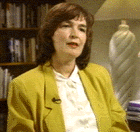 GAIL HOUSTON: The language
that God has spoken to me through has been through an incredibly loving
Father, who is married to an incredibly loving Mother. If youíve had a
sacred experience, you cannot deny it. When I first really felt her presence
was after my own mother had passed away.
GAIL HOUSTON: The language
that God has spoken to me through has been through an incredibly loving
Father, who is married to an incredibly loving Mother. If youíve had a
sacred experience, you cannot deny it. When I first really felt her presence
was after my own mother had passed away.
And at the time, I was really affected by my motherís passing away, and I
couldnít imagine that anyone would ever want me to forget my mother, my
earthly mother, and I couldnít imagine that anyone would ever want me to
forget my Heavenly Mother. And I say that in all love and kindness towards
President Hinckley. I just have to--I cannot deny what God has told me.
RICHARD OSTLING: President Hinckley says the Mother in Heaven cannot be the
object of prayer.
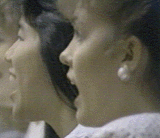 PRESIDENT GORDON
HINCKLEY: The fact of the matter is that in every instance of record, where
deity is addressed, the address is to the Father. Now, thatís where we
stand, and itís simply that; no more, no less.
PRESIDENT GORDON
HINCKLEY: The fact of the matter is that in every instance of record, where
deity is addressed, the address is to the Father. Now, thatís where we
stand, and itís simply that; no more, no less.
RICHARD OSTLING: Brigham Youngís President, Merrill Bateman, says the
universityís close ties to the church meant Houston had to go.
MERRILL BATEMAN, President, Brigham Young University: Although we want to
ensure that every faculty 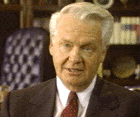 member
has the right to discuss and analyze as broadly and widely as possible any
topic, including religious topics, including fundamental doctrine of the
church, we do not believe they have--they should be able to publicly endorse
positions contrary to doctrine, or to attack the doctrine.
member
has the right to discuss and analyze as broadly and widely as possible any
topic, including religious topics, including fundamental doctrine of the
church, we do not believe they have--they should be able to publicly endorse
positions contrary to doctrine, or to attack the doctrine.
RICHARD OSTLING: During the 1990's, there have been many cases like
Houstonís in which teachers at Brigham Young and others in the church have
been disciplined for various infractions. Dissent is growing, especially among
younger women, who want to expand beyond their traditional roles and have a
greater voice in the church.
MERRILL BATEMAN: Anybody who persists in opposing the church--public
opposition--speaking out against it--I think may receive some discipline from
the church. Itís just that simple. But those cases are so very, very, very
few.
RICHARD OSTLING: Elbert Peck, whose independent Sunstone Magazine
publishes dissenting views, says that rapid expansion is causing the church to
limit the questioning so as not to confuse new members. But he fears clamping
down comes at a price.
 ELBERT PECK, Sunstone
Magazine: If you are members of a family, then unless you can speak the
truth as you see it--and you need to speak the truth in love because youíre
connected in a covenantal relationship--then you end up with the same
dysfunctions in your church organization as you do within a family when
secrets are kept. And individuals are not being to speak the truth that they
see. Theyíre not able to say when we do this to the family, it really hurts
me. You know, their great pain comes out. And you hear that pain when you
listen to the dissidents in the church.
ELBERT PECK, Sunstone
Magazine: If you are members of a family, then unless you can speak the
truth as you see it--and you need to speak the truth in love because youíre
connected in a covenantal relationship--then you end up with the same
dysfunctions in your church organization as you do within a family when
secrets are kept. And individuals are not being to speak the truth that they
see. Theyíre not able to say when we do this to the family, it really hurts
me. You know, their great pain comes out. And you hear that pain when you
listen to the dissidents in the church.
RICHARD OSTLING: For Houston, asking questions is essential to spiritual
development.
GAIL HOUSTON: If our only principle in the church is obedience, then we
remain children. And our church says we can be gods. The relationship with my
God is I can ask them anything, anything. I can even say, well, what if 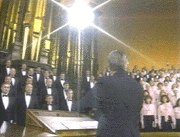 this
church isnít true, what if this is all nothing, and funny thing, that
enlarges my testimony. It doesnít limit it. (singing in background)
this
church isnít true, what if this is all nothing, and funny thing, that
enlarges my testimony. It doesnít limit it. (singing in background)
RICHARD OSTLING: The (members of the Church of Jesus Christ of) Latter-day
Saints remarkable test story is part of a broader pattern in religion today.
Faiths that offer doctrinal certainty and clear directives on how to live are
steadily gaining ground. But Mormons also have a tradition of open inquiry.
The challenge ahead is how to balance that principle with an increasing demand
for obedience. (singing in background)